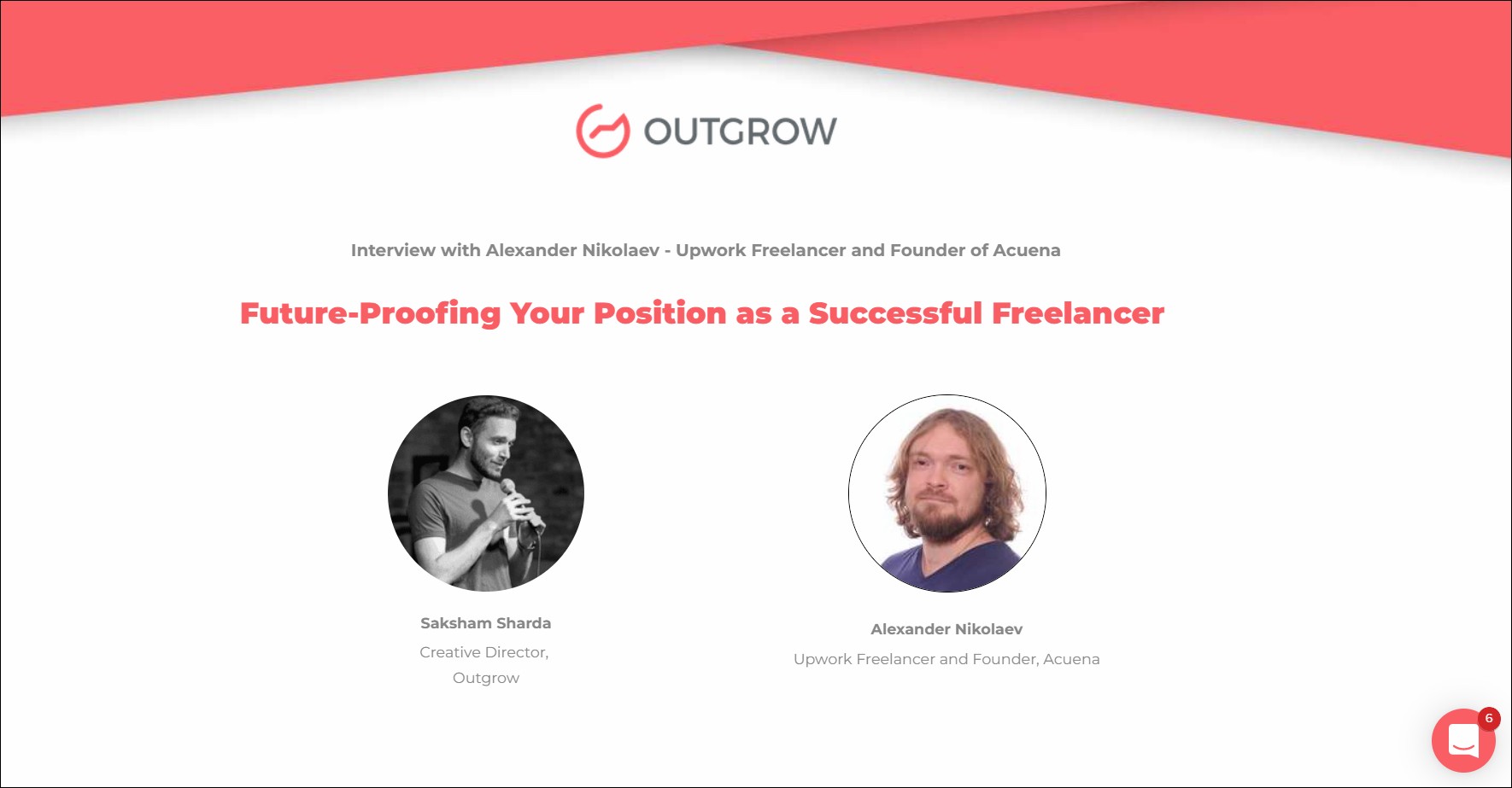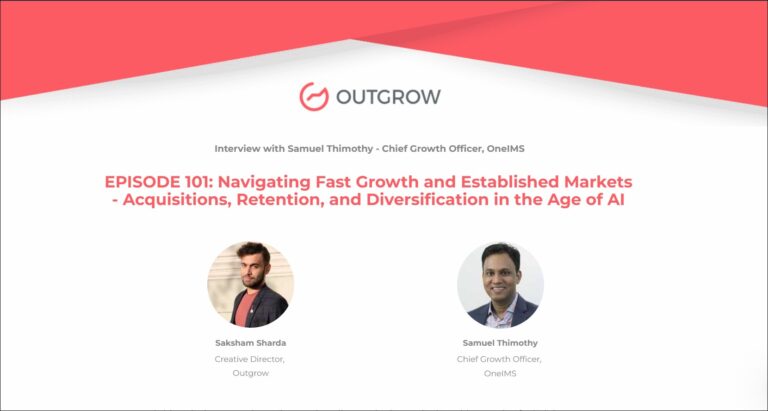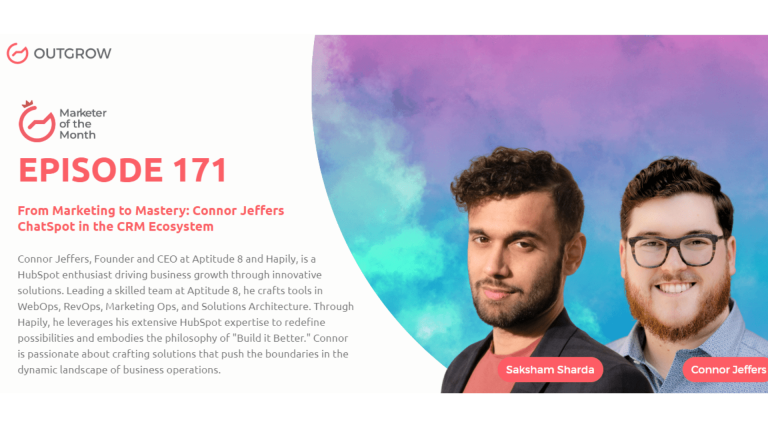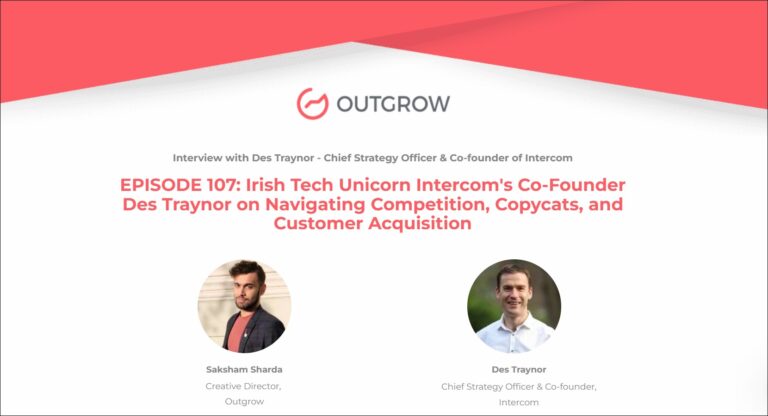Summarize with :
Marketer of the Month Podcast With Alexander Nikolaev
Table of Contents
Hey there! Welcome to the Marketer Of The Month blog!
We recently interviewed Freelancer of the Month ‘Alexander Nikolaev’ for our monthly podcast – ‘Marketer of the Month’! We had some amazing insightful conversations with Alex and here’s what we discussed about –
1. Visualizing the funnel and understanding the business
2. Capturing user intent efficiently
3. Global automation trends: will campaign manager positions remain relevant in the future?
4. What most people get wrong about Conversion Rate Optimization
5. The key to reaching Top Rated freelancer status
6. Thoughts on Meta’s plans to expand its monetisation policy
About our host:
Dr. Saksham Sharda is the Chief Information Officer at Outgrow.co. He specializes in data collection, analysis, filtering, and transfer by the means of widgets and applets. Interactive, cultural, and trending widgets designed by him have been featured on TrendHunter, Alibaba, ProductHunt, New York Marketing Association, FactoryBerlin, Digimarcon Silicon Valley, and at The European Affiliate Summit.
About our guest:
Alexander Nikolaev has spent the last 15 years in the marketing and advertising industry – working as an internal marketer for various businesses. Apart from running his own advertising agency, Acuena, Alexander is also a Top Rated Upwork Freelancer, a status which he has maintained for roughly 6 years now.
Future-Proofing Your Position as a Successful Freelancer
The Intro!
Saksham Sharda: Hi, everyone. Welcome to another episode of Outgrow’s Marketer of the Month. I’m your host, Dr. Saksham Sharda and I’m the creative director at Outgrow.co. And for this month we’re going to interview Alex Nikolaev, who is a freelance advertising expert. Thanks for joining us, Alex.
Alexander Nikolaev: My pleasure.
Don’t have time to read? No problem, just watch the Podcast!
Or you can just listen to it on Spotify!
The Rapid Fire Round!
Saksham Sharda: So Alex, we’re going to start with a rapid-fire round just to break the ice, you get three passes. In case you don’t want to answer the question, you can just say pass but try to keep your answers to one word or one sentence only. Okay?
Alexander Nikolaev: Okay.
Saksham Sharda: All right to the first one. At what age do you want to retire?
Alexander Nikolaev: 40
Saksham Sharda: How do you relax?
Alexander Nikolaev: Hang out with my family.
Saksham Sharda: A fruit you can eat any time of the day?
Alexander Nikolaev: Banana
Saksham Sharda: What historical event do you wish you could have witnessed?
Alexander Nikolaev: Well, let’s say the Titanic release.
Saksham Sharda: Okay. A film that can be seen several times without becoming boring?
Alexander Nikolaev: Back to the Future.
Saksham Sharda: What are you most likely to be arrested for?
Alexander Nikolaev: That’s a tough one. Probably, I don’t know, being too formal.
Saksham Sharda: A habit of yours that you hate?
Alexander Nikolaev: Procrastination.
Saksham Sharda: Work from home or work from office?
Alexander Nikolaev: From home.
Saksham Sharda: How many hours of sleep can you survive on?
Alexander Nikolaev: The minimum I can survive on is five to six.
Saksham Sharda: How many cups of coffee do you drink per day?
Alexander Nikolaev: Half a cup.
Saksham Sharda: Your favorite Netflix show?
Alexander Nikolaev: Netflix originally mean? Or just the one that streams on Netflix?
Saksham Sharda: Streams.
Alexander Nikolaev: Well, “Friends”.
Saksham Sharda: Okay, the most valuable skill you’ve learned in life?
Alexander Nikolaev: Communication.
Saksham Sharda: How long does it take you to get ready in the mornings?
Alexander Nikolaev: Not instantly.
Saksham Sharda: The city in which the best kiss of your life happened?
Alexander Nikolaev: The city of Nikolaev, my hometown.
Saksham Sharda: Okay. And so that was the end of the rapid-fire round, you did quite well, you managed to answer everything quite fast. So that was great.
The Big Questions!
Saksham Sharda: Now moving on to the long-form questions. The first one is, as a paid search specialist, do you think your ability to visualize the funnel with searches has helped you understand the marketing side of things?
Alexander Nikolaev: I do think so definitely. The thing is with freelancers, marketing agencies, or marketing experts, this is something I mean, visualizing the funnel and understanding the business. This is something that gets overlooked and ignored very often, a lot more often than it should be. And keeping that in mind, not just visualizing it initially, but making sure that it sticks around and stays with you as you progress with the project and work with the client on and on. Having that picture in front of you during the thought process is priceless. It’s something that should always be in the background. And that should always stay with us. Otherwise, things may just not work out well with the project. And the thing is, as I’ve said, with the agencies, this is something that gets overlooked. And I have witnessed this happen all the time. Thing is that many of my clients who approached me, who’ve worked with other freelancers or agencies who are experts in the past, either on that same project or on something else. And from the contacts that I get or from how they share their experience, I can tell that this is a hugely common thing in the industry. The experts really should not overlook that at least if they want to be considered an expert. So yeah, visualizing the funnel and understanding the business is a priceless thing.
Saksham Sharda: And why do you think people tend to overlook visualizing the funnel in the first place?
Alexander Nikolaev: Well, it’s an easy mistake to make. Because with freelancers and agencies, not only that, with in-house employees, people are always in a hurry. They don’t invest a lot into the initial research and they just want to get things done. And as soon as possible in many cases, the clients rush them, or the management rushes them, and they just want to start implementing the campaigns. As soon as possible, right away, initially. However, in my opinion, we should always start with initial research, we should get to know the business better, the client better, the competitive environment, and the competitive advantages that the client’s project or product has. And only after that, when we can complete this initial get-to-know the project stage. Only then it’s possible and it makes sense to start working on the setup itself.
Saksham Sharda: This is kind of related to the next question which is, that capturing user intent and doing so efficiently will always be challenging and different for every business. So to what extent do you agree or disagree with this statement?
Alexander Nikolaev: Yeah, I completely agree. This is very much connected with the points that I’ve just made. The user intent is one of the crucial things that unfold during this initial research stage that I’ve mentioned, and it’s highly important to get this part right (the user intent) because everything else in your setup, I mean, the advertising campaign, the landing page is everything. Everything may be perfect. It may be like flawless. But if user intent is something that you don’t get right, everything else is ruined. I mean, all of the effort that you’ve invested, the costs that the client has invested, that it doesn’t matter any longer, because the user intent is just not there. It’s not right. For example, with search campaigns, like Google ads, the targeted keywords are what’s the red flag to the user intent. And if you don’t get the user intent right, get the wrong keywords, then that means the budget and the ad spend just goes to waste. The traffic is not relevant. And the whole project, the whole advertising campaign just becomes useless. So yeah, the user intent is just crucial, of course.
Saksham Sharda: So what’s a good way of going about capturing user intent?
Alexander Nikolaev: Well, capturing the user intent is what becomes obvious to you, well at least to me with my approach. I cannot say for everyone, but with my approach the user intent becomes obvious. Whenever I spend enough time on the initial research, whenever I understand the client’s business correctly, whenever I communicate with the client in the onboarding stage. So yeah, that’s when building out this whole big picture, the contact that surrounds the advertising campaign, is what allows me to get the user intent right.
Saksham Sharda: And what do you think what role will automation, like increasing automation, have to play in all this? Like, does the campaign manager position have a bright or bleak future? Will campaign managers be more relevant than ever or increasingly they’ll become less relevant?
Alexander Nikolaev: Well I get that a lot. This is a very popular question. Even my clients asked me this all the time, whether or not my role will become obsolete over time. And in my opinion, it will not. I mean the idea and the concept of automation do imply a completely autonomous mode but in reality, what we see now, that’s not the case. Today’s stage of this automation evolution does not allow the fully autonomous mode. There are a lot of white spots in the setup that are completely automated. And besides, there’s this important aspect with the advertising platforms is that they were by the means automation, they tried to get the advertisers to spend more. That’s a completely normal thing, obviously for them, because these are businesses, they want to maximize their profits. And they often do that by the means of tricking the advertisers into spending more. For me, that’s not a big problem, because as an advertising manager, I can always know where to look for things like this. And it’s easy for me to spot these overspending efforts and things that do not make a lot of sense to the client or their campaigns. So that’s what makes the advertising manager role important now with today’s stage of automation. But even if everything is fixed in the future, if the technical issues with the automation and machine learning are addressed, everything is perfect, hypothetically, even in that case, even at that stage, I’m pretty sure that the advertising manager role will still be important. Because just like in case with the global automation trend, and machine learning and robots helping us do their daily tasks, even in that case, it has already become obvious that we do need actual live people to oversee the process, to adjust everything, to understand the logic, and then fine-tune these processes. So in that regard, the way I see it, the advertising campaign manager role will still be needed. And we’ll still have some work to do.
Saksham Sharda: So what advice would you give to an advertising manager or actually to just clients about conversion rate optimization, like what are clients doing wrong? And what is often the most successful solution?
Alexander Nikolaev: Well, there are a lot of things that people do wrong or get wrong about either the conversion rate optimization or other components of the campaigns. And that’s not necessarily a bad thing, it doesn’t mean that they’re stupid or something is just that they see it from a different perspective from their perspective. And that makes a lot of sense. That’s completely obvious. For example, the owners of the business often want to overcommunicate, as I call it, they just fixate on how much information they tell, or deliver about their business, about how they love their clients, about how good they are in their industry, etc. But in reality, this amount of information and this tone of delivering the information doesn’t necessarily make much sense. From the marketing perspective, at least because clients don’t care about how much the provider of the services loves them or how good the provider thinks he is or something, the end user only cares about himself or themselves. So how I fix that is I will just deliver and explain this position to the clients and together, we change the tone, we adjust the landing page content towards making it better, more value-oriented, and value-driven. And in many cases because again, with the amount of content that clients tend to place on their landing pages, a landing page just turns into an encyclopedia, which would don’t want a thing with the paid traffic. One of the biggest things about paid traffic is that these users don’t spend a lot of time on landing pages, and we have seconds to capture their attention and deliver the information and convince these people to convert. And yeah, speaking of the landing pages, that’s also one of the major things that get often overlooked by the client. I mean, selling the idea of using landing pages is not always easy. The clients think that they’ve already invested in our website, and they want to use that website in advertising campaigns. Whereas in reality, every advertising campaign needs its landing page, or even several landing pages optimized for proper segments of traffic or proper keywords or proper messaging, even in the ads. So yeah, these are probably the major things that I would say the clients get wrong about the conversion rate optimization.
Saksham Sharda: And when it comes to your drone work with the clients, what do you think has helped you the most in reaching a top-rated Freelancer status on Upwork and retaining it for six straight years?
Alexander Nikolaev: I think that communication is one of the biggest game changers. To me personally, although the status that I have on Upwork, consists of a lot of factors and has become possible due to a lot of reasons like past experiences, qualifications, certifications, skills, etc. But none of that matters if the communication is off. So, communicating these ideas and communicating the right implementations is what has made it possible. And aside from that, the top-rated status on Upwork is a pretty fun thing. I mean, they’ve implemented it in a very interesting way. And I think this is a very neat thing that they’ve done. Aside from the feedback and the positive feedback that you get from clients, to become top rated, or have higher status, which I happen to have as well, you also have to be very active in terms of work. So it’s not only the feedback, the positive feedback that you get, it’s also required applied implementation of your skills. So you have to be an active freelancer, you have to have active ongoing projects with clients aside from just the positive feedback.
Saksham Sharda: And how do you plan to deal with change as it’s coming along? For instance, with Facebook’s plan to expand its monetization policy and provide additional monetization tools on Instagram and Facebook? How are you going to incorporate this into your business? What do you think about it?
Alexander Nikolaev: Well the funny thing about these changes is that they are constant. The major advertising platforms that I work with, and that other freelancers work with won’t matter, are Facebook ads, Instagram ads, and Google ads. They always evolve, they always change something about either the policies or the ad formats or the technical implementations of tracking. So this is like a boiling pot of constant changes, this is actually what makes it so much fun among other things. So what I think about these latest changes from Meta is, that we will adjust, and we will see how exactly that will be implemented. Because right now, there are several ideas and comments that, Meta has provided on how exactly they will implement it, on what will be implemented, etc. But I’m pretty sure that we as an advertising managers community will be able to adjust to it just perfectly. And these latest changes that they’ve announced seem to be more focused on the content creators, monetizing their efforts. And in that regard, this does look like something that has already been implemented on other platforms like YouTube, Tiktok, and other possible options. And we’ve seen how things have unfolded there. Especially even from our advertising industry perspective, so we kind of know what to expect, in this direction as well. So I’m pretty sure that we’ll be able to figure things out and adjust. But definitely, I like the fact that these platforms evolve and adjust, and adapt to how the world around us changes. I mean, we’ve seen the blooming and booming success of the content creators on different platforms. And obviously, these platforms want to integrate advertising, and monetization into all of that. It’s a good thing that we as advertisers can be part of this, and help clients get some benefits from this whole thing. So yeah, I like it. I like the fact that things are changing and evolving. And I like the fact that I get to be a part of it.
Saksham Sharda: Okay, and speaking of hypothetical chains, the last question is, what would you be doing, if not this in your life right now?
Alexander Nikolaev: I’ve tried a number of careers in the past before I got to the advertising industry. And the thing that it’s a big direction that I’ve enjoyed very much. Before that was content creation, I used to be a blogger, I used to be an editor in chief of a network of tech blogs. I used to produce content videos, content for the tech industry. So yeah, that’s something I enjoy. And if not for advertising, then I guess I probably would have become a content creator.
Saksham Sharda: Okay, alright. So instead of advertising content, you’d be producing the content.
Alexander Nikolaev: Well, if you look at it that way. Yeah, I guess.
Saksham Sharda: Okay. Well, that was the last question.
Let’s Conclude!
Saksham Sharda: Thanks everyone, for joining us for this month’s episode of Outgrow’s Marketer of the Month. That was Alexander Nikolaev, who is a freelance advertising expert. Thanks for joining us, Alex.
Alexander Nikolaev: Thanks for having me.
Saksham Sharda: And check out his website for more details. The website is you can pronounce it yourself.
Alexander Nikolaev: Yeah, it’s acuena.agency. This is the website that I have for my advertising efforts.







